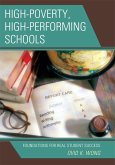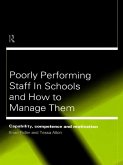Cletus R. Bulach, Frederick C. Lunenburg, Les Potter
Creating a Culture for High-Performing Schools (eBook, ePUB)
A Comprehensive Approach to School Reform and Dropout Prevention
30,95 €
30,95 €
inkl. MwSt.
Sofort per Download lieferbar

15 °P sammeln
30,95 €
Als Download kaufen

30,95 €
inkl. MwSt.
Sofort per Download lieferbar

15 °P sammeln
Jetzt verschenken
Alle Infos zum eBook verschenken
30,95 €
inkl. MwSt.
Sofort per Download lieferbar
Alle Infos zum eBook verschenken

15 °P sammeln
Cletus R. Bulach, Frederick C. Lunenburg, Les Potter
Creating a Culture for High-Performing Schools (eBook, ePUB)
A Comprehensive Approach to School Reform and Dropout Prevention
- Format: ePub
- Merkliste
- Auf die Merkliste
- Bewerten Bewerten
- Teilen
- Produkt teilen
- Produkterinnerung
- Produkterinnerung
- Weitere 6 Ausgaben:
- Gebundenes Buch
- Gebundenes Buch
- Broschiertes Buch
- Broschiertes Buch
- eBook, PDF
- eBook, PDF

Bitte loggen Sie sich zunächst in Ihr Kundenkonto ein oder registrieren Sie sich bei
bücher.de, um das eBook-Abo tolino select nutzen zu können.
Hier können Sie sich einloggen
Hier können Sie sich einloggen
Sie sind bereits eingeloggt. Klicken Sie auf 2. tolino select Abo, um fortzufahren.

Bitte loggen Sie sich zunächst in Ihr Kundenkonto ein oder registrieren Sie sich bei bücher.de, um das eBook-Abo tolino select nutzen zu können.
A high-performing school is described as one where student achievement is high and student and teacher absenteeism is low. Student behavior is such that teachers seldom have to control them or tell them what to do. This results in greater time on task, higher teacher morale, low teacher absenteeism, and improved parental support. One other distinctive feature of a high-performing school is that the student peer group is a positive force and not a negative force. The end result is a school culture where faculty and students trust and care about each other, and there is a cooperative attitude.
- Geräte: eReader
- ohne Kopierschutz
- eBook Hilfe
Andere Kunden interessierten sich auch für
![Enhancing a High-Performing School Culture and Climate (eBook, ePUB) Enhancing a High-Performing School Culture and Climate (eBook, ePUB)]() Cletus R. BulachEnhancing a High-Performing School Culture and Climate (eBook, ePUB)26,95 €
Cletus R. BulachEnhancing a High-Performing School Culture and Climate (eBook, ePUB)26,95 €![High-Poverty, High-Performing Schools (eBook, ePUB) High-Poverty, High-Performing Schools (eBook, ePUB)]() Ovid K. WongHigh-Poverty, High-Performing Schools (eBook, ePUB)24,95 €
Ovid K. WongHigh-Poverty, High-Performing Schools (eBook, ePUB)24,95 €![Creating Engagement between Schools and their Communities (eBook, ePUB) Creating Engagement between Schools and their Communities (eBook, ePUB)]() Creating Engagement between Schools and their Communities (eBook, ePUB)33,95 €
Creating Engagement between Schools and their Communities (eBook, ePUB)33,95 €![Poorly Performing Staff in Schools and How to Manage Them (eBook, ePUB) Poorly Performing Staff in Schools and How to Manage Them (eBook, ePUB)]() Tessa AttonPoorly Performing Staff in Schools and How to Manage Them (eBook, ePUB)14,95 €
Tessa AttonPoorly Performing Staff in Schools and How to Manage Them (eBook, ePUB)14,95 €![Privileged Thinking in Today's Schools (eBook, ePUB) Privileged Thinking in Today's Schools (eBook, ePUB)]() David BarnettPrivileged Thinking in Today's Schools (eBook, ePUB)20,95 €
David BarnettPrivileged Thinking in Today's Schools (eBook, ePUB)20,95 €![Reinventing Schools (eBook, ePUB) Reinventing Schools (eBook, ePUB)]() Charles M. ReigeluthReinventing Schools (eBook, ePUB)22,95 €
Charles M. ReigeluthReinventing Schools (eBook, ePUB)22,95 €![Compliance Cop to Culture Coach (eBook, ePUB) Compliance Cop to Culture Coach (eBook, ePUB)]() William A. SommersCompliance Cop to Culture Coach (eBook, ePUB)18,95 €
William A. SommersCompliance Cop to Culture Coach (eBook, ePUB)18,95 €-
-
-
A high-performing school is described as one where student achievement is high and student and teacher absenteeism is low. Student behavior is such that teachers seldom have to control them or tell them what to do. This results in greater time on task, higher teacher morale, low teacher absenteeism, and improved parental support. One other distinctive feature of a high-performing school is that the student peer group is a positive force and not a negative force. The end result is a school culture where faculty and students trust and care about each other, and there is a cooperative attitude.
Produktdetails
- Produktdetails
- Verlag: Bloomsbury eBooks US
- Seitenzahl: 188
- Erscheinungstermin: 16. Dezember 2011
- Englisch
- ISBN-13: 9781610483230
- Artikelnr.: 38333322
- Verlag: Bloomsbury eBooks US
- Seitenzahl: 188
- Erscheinungstermin: 16. Dezember 2011
- Englisch
- ISBN-13: 9781610483230
- Artikelnr.: 38333322
- Herstellerkennzeichnung Die Herstellerinformationen sind derzeit nicht verfügbar.
Cletus R. Bulach, a retired Ohio school superintendent and college professor, has conducted research on principal leadership, character education, teacher caring behaviors, bullying behavior, school climate and culture, and group openness and trust. He has also developed surveys to collect data on these areas of research and has numerous publications based on these data.
Fred C. Lunenburg is the Jimmy N. Merchant Professor of Education and Senior Research Fellow in the Center for Research and Doctoral Studies in Educational Leadership at Sam Houston State University. Prior to moving to the university, he served as a teacher, principal, and superintendent of schools. He has authored or co-authored more than 100 articles and 20 books, including, Education Administration: Concepts and Practices (Thomson/Wadsworth, 1991, 1996, 2000, 2004, 2008), The Principalship: Vision to Action (Thomson/Wadsworth, 2006), Shaping the Future (Rowman & Littlefield, 2003), The Changing World of School Administration (with George Perreault) (Rowman & Littlefield, 2002), and High Expectations: An Action Plan for Implementing Goals 2000 (Corwin Press, 2000).
Les Potter is the author of over 70 educational publications and has been a school principal and professor for several universities. Potter will be contributing from the practical point of view as he has been principal of seven schools in four states and recognized in several states for his contributions to education.
Fred C. Lunenburg is the Jimmy N. Merchant Professor of Education and Senior Research Fellow in the Center for Research and Doctoral Studies in Educational Leadership at Sam Houston State University. Prior to moving to the university, he served as a teacher, principal, and superintendent of schools. He has authored or co-authored more than 100 articles and 20 books, including, Education Administration: Concepts and Practices (Thomson/Wadsworth, 1991, 1996, 2000, 2004, 2008), The Principalship: Vision to Action (Thomson/Wadsworth, 2006), Shaping the Future (Rowman & Littlefield, 2003), The Changing World of School Administration (with George Perreault) (Rowman & Littlefield, 2002), and High Expectations: An Action Plan for Implementing Goals 2000 (Corwin Press, 2000).
Les Potter is the author of over 70 educational publications and has been a school principal and professor for several universities. Potter will be contributing from the practical point of view as he has been principal of seven schools in four states and recognized in several states for his contributions to education.
Chapter 1 A Four-Step Process for Identifying and Reshaping the Culture of
a School
Part 1 School Reform Processes
Part 2 Enhancing a School's Culture and Climate
Chapter 2 Implementing a Plan to Improve the Climate and Culture of the
School
Part 3 Leadership Skills Needed
Chapter 3 Power and Authority: Nine Techniques for Motivating Faculty and
Students
Part 4 Intergroup Processes
Chapter 4 Four Types of School Culture
Chapter 5 A Character Education Program That Is the Foundation of a High
Performing School
Part 5 Program Planning
Chapter 6 Six Strategies for Enhancing a School's Culture and Climate
Part 6 Assessment
Chapter 7 Community, Culture, and Learning
Chapter 8 Professional Development
Chapter 9 Management of the Program
Chapter 10 Developing Interpersonal Relations
Chapter 11 Self-Disclosure
Chapter 12 Developing Trust
Chapter 13 Values Clarification
Chapter 14 Improving Communication Skills
Chapter 15 Resolving Conflicts
Chapter 16 Design for Learning
Chapter 17 Assessing Students' Interests and Abilities
Chapter 18 Conferencing: Reporting Student Progress
Chapter 19 Program Evaluation
a School
Part 1 School Reform Processes
Part 2 Enhancing a School's Culture and Climate
Chapter 2 Implementing a Plan to Improve the Climate and Culture of the
School
Part 3 Leadership Skills Needed
Chapter 3 Power and Authority: Nine Techniques for Motivating Faculty and
Students
Part 4 Intergroup Processes
Chapter 4 Four Types of School Culture
Chapter 5 A Character Education Program That Is the Foundation of a High
Performing School
Part 5 Program Planning
Chapter 6 Six Strategies for Enhancing a School's Culture and Climate
Part 6 Assessment
Chapter 7 Community, Culture, and Learning
Chapter 8 Professional Development
Chapter 9 Management of the Program
Chapter 10 Developing Interpersonal Relations
Chapter 11 Self-Disclosure
Chapter 12 Developing Trust
Chapter 13 Values Clarification
Chapter 14 Improving Communication Skills
Chapter 15 Resolving Conflicts
Chapter 16 Design for Learning
Chapter 17 Assessing Students' Interests and Abilities
Chapter 18 Conferencing: Reporting Student Progress
Chapter 19 Program Evaluation
Chapter 1 A Four-Step Process for Identifying and Reshaping the Culture of
a School
Part 1 School Reform Processes
Part 2 Enhancing a School's Culture and Climate
Chapter 2 Implementing a Plan to Improve the Climate and Culture of the
School
Part 3 Leadership Skills Needed
Chapter 3 Power and Authority: Nine Techniques for Motivating Faculty and
Students
Part 4 Intergroup Processes
Chapter 4 Four Types of School Culture
Chapter 5 A Character Education Program That Is the Foundation of a High
Performing School
Part 5 Program Planning
Chapter 6 Six Strategies for Enhancing a School's Culture and Climate
Part 6 Assessment
Chapter 7 Community, Culture, and Learning
Chapter 8 Professional Development
Chapter 9 Management of the Program
Chapter 10 Developing Interpersonal Relations
Chapter 11 Self-Disclosure
Chapter 12 Developing Trust
Chapter 13 Values Clarification
Chapter 14 Improving Communication Skills
Chapter 15 Resolving Conflicts
Chapter 16 Design for Learning
Chapter 17 Assessing Students' Interests and Abilities
Chapter 18 Conferencing: Reporting Student Progress
Chapter 19 Program Evaluation
a School
Part 1 School Reform Processes
Part 2 Enhancing a School's Culture and Climate
Chapter 2 Implementing a Plan to Improve the Climate and Culture of the
School
Part 3 Leadership Skills Needed
Chapter 3 Power and Authority: Nine Techniques for Motivating Faculty and
Students
Part 4 Intergroup Processes
Chapter 4 Four Types of School Culture
Chapter 5 A Character Education Program That Is the Foundation of a High
Performing School
Part 5 Program Planning
Chapter 6 Six Strategies for Enhancing a School's Culture and Climate
Part 6 Assessment
Chapter 7 Community, Culture, and Learning
Chapter 8 Professional Development
Chapter 9 Management of the Program
Chapter 10 Developing Interpersonal Relations
Chapter 11 Self-Disclosure
Chapter 12 Developing Trust
Chapter 13 Values Clarification
Chapter 14 Improving Communication Skills
Chapter 15 Resolving Conflicts
Chapter 16 Design for Learning
Chapter 17 Assessing Students' Interests and Abilities
Chapter 18 Conferencing: Reporting Student Progress
Chapter 19 Program Evaluation







